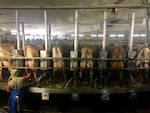The Oregon Supreme Court recently heard oral arguments about whether a lawsuit against the Tillamook County Creamery Association should be allowed to proceed. That lawsuit, filed in 2019 by an animal welfare group, alleges Tillamook of misleading marketing and misrepresenting its livestock practices.
Tillamook, founded in 1909 as a farmer-owned cooperative, and known for its varieties of cheese, ice cream and yogurt, is accused of “greenwashing” — the act of making false or misleading statements to persuade consumers that a company is environmentally friendly.
Tillamook has denied the allegations, and said it’s open about its environmental stewardship practices.
The five-year-old lawsuit, filed as a class action by the Animal Legal Defense Fund on behalf of four Oregon residents, alleges Tillamook’s advertising campaigns allowed the creamery to sell its products at a premium. It claims the creamery’s marketing led consumers to believe its milk is sourced from small, family-owned, pasture-based dairies in Tillamook County, when in reality it sources two-thirds of its milk from one of the country’s largest factory farms with over 28,000 dairy cows.
“Located in eastern Oregon, this complex of cement-floored production facilities and barren dirt feedlots, where cows are continuously confined, milked by robotic carousels, and afflicted with painful udder infections, is a far cry from the rolling green hills of the Tillamook County family farms shown throughout Tillamook’s marketing campaign,” reads the California-based animal rights nonprofit’s lawsuit.

In this 2017 file photo, dairy cows have their milk pumped at Threemile Canyon Farms in Boardman, Ore. One of Threemile's dairies provides milk to the Tillamook creamery.
Courtney Flatt
The dairy farm in question, Columbia River Dairy, is located just outside Boardman, Oregon — where Tillamook also runs a secondary cheesemaking facility. Columbia River is owned by Threemile Canyon Farms, which is one of a handful of farms and agricultural processors recently sued in a separate class action by Eastern Oregon residents for contributing to a decadeslong nitrates pollution crisis in the Lower Umatilla Basin. Threemile also operates a beef operation and farms a variety of crops on 93,000 acres of land.
The plaintiffs are seeking an injunction against Tillamook ordering the company to either change its marketing campaigns or change its livestock treatment practices.
Tillamook did not comment on the claims. OPB reached out separately to the Oregon Dairy Farmers Association, which didn’t respond for comment by the time this story was published.
In a court document, Tillamook said it hasn’t tried to hide its relationship with Columbia River Dairy or Threemile Canyon Farms.
“Since 2001, TCCA’s [Tillamook County Creamery Association] relationship with Threemile Canyon Farms has been widely-publicized in the media,” read the document. “The FAQ page on TCCA’s website states that TCCA does not source all of its milk from Tillamook County, sources milk from large dairies, has a facility in Boardman, and whether or not the cows from which it sources its milk graze on pasture depends on the farm.”
In a written statement given to OPB, Tillamook said it takes pride in its yearslong partnership with Columbia River Dairy, and that the farm’s size does not dictate the quality of care its dairy cows receive.
“The Animal Legal Defense Fund is anti-dairy and actively advocates for people to cut all dairy products from their diets,” the statement read. “The Tillamook County Creamery Association adamantly disagrees with the allegations made in the lawsuit, and we have been aggressively defending ourselves against those false allegations since the lawsuit was first filed back in 2019.”

A screenshot of Tillamook's website submitted as evidence by the Animal Legal Defense Fund.
Court document / Tillamook via Multnomah County Circuit Court
The Oregon Supreme Court hearing, held on March 4, however, wasn’t about whether or not Tillamook’s marketing was deceptive. The case was originally filed in the Multnomah County Circuit Court. A judge in that court dismissed it as a class action in 2020, and the Oregon Court of Appeals affirmed that judge’s decision in 2022.
In her decision, Multnomah County Circuit Judge Kelly Skye wrote the case does not qualify as a class action because each plaintiff would have to prove they relied on Tillamook’s advertising when deciding to purchase its products — narrowing the number of people who can join the litigation.
“The class definition must be related to consumers who purchased Tillamook products in reliance of Tillamook marketing representations that are the subject of the complaint,” wrote Skye.
Now, the plaintiffs are looking to reverse those decisions. They argue consumers still bought Tillamook’s products at a premium, regardless of whether they saw the advertisements or not.
Joyce Tischler, a professor of animal law at the Lewis and Clark College law school, said she believes the lower court misinterpreted an Oregon consumer protection law in its decision making and that it’s in consumers best interest for the lawsuit to be allowed to move forward.
“The court is supposed to accept the allegations of the complaint as true because there has been no discovery, there’s been no factual development at all,” Tischler said. “So the plaintiffs should be allowed the opportunity to offer proof. They should be allowed to get past the motion to dismiss so that they can then get into the substantive matters.”
Tischler said similar lawsuits against food giants, such as food manufacturers and fast food chains, are on the rise nationwide as consumers seek to support companies that align with their values, whether it’s environmentally conscious farming practices or humane animal conditions.
“It [lawsuits] forces the producer, this massive company that’s making a lot of money, to be honest with the public, to tell the truth,” Tischler said.
It’s uncertain when the Oregon Supreme Court will issue its decision.




